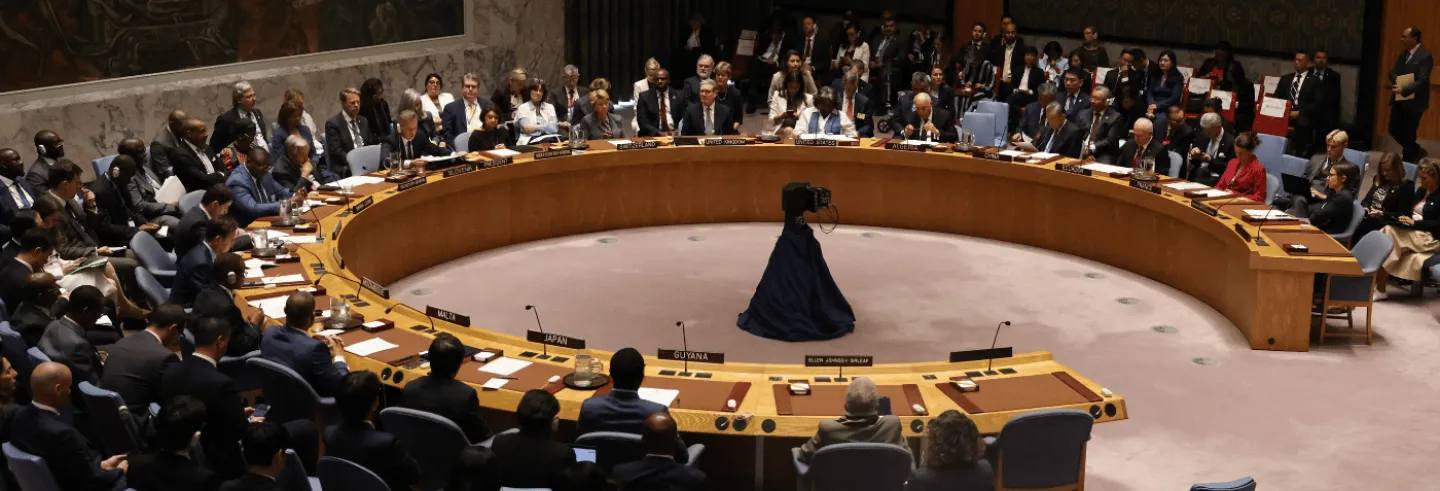For a year, the world has watched as more than 41,000 Palestinians have been killed in Gaza, and a further 1.9 million people displaced.
In Sudan, an 18-month-long civil war has claimed more than 20,000 lives and displaced more than 10 million people.
Sadly, these are not the world’s only conflicts, and there is little to suggest there is an end in sight.
At the recent meeting of the UN General Assembly in New York, UN Secretary-General Antonio Guterres declared: “Wars rage with no clue how they will end.”
Guterres lamented that we now live in a world where states, “can turn a blind eye to international human rights conventions […] They can thumb their nose at international humanitarian law […] lay waste to whole societies, or utterly disregard the welfare of their own people”.
Confronted with this grim picture, one might well ask what has happened to the Responsibility to Protect – the idea that states must protect their own populations from atrocities, and when they fail, the international community must take action.
Nothing new
In 2005, the world’s states signed the World Summit Outcome Document. It included the declaration that every state has, “a responsibility to protect its populations from genocide, war crimes, ethnic cleansing and crimes against humanity”.
It also stated that the “international community” pledged, “to protect populations” from atrocity crimes wherever they were occurring.
The inclusion of these commitments was heralded as a huge breakthrough by the champions of this new doctrine, which quickly came to be known by the shorthand R2P.
But despite the fanfare, R2P has proved to be ineffective.
The 2005 commitment, though certainly noble and ambitious, was in reality hardly new.
“Never again!” was loudly declared after the Holocaust, and following the establishment of the UN, a wide range of international laws were ratified outlawing genocide, crimes against humanity and war crimes.
The real problem
The problem has never been a shortage of laws or earnest commitments.
The problem was – and still is – enforcement.
The myriad laws created since 1945 relating to the protection of human rights – specifically those that relate to the international community intervening in the internal affairs of a sovereign state – depend for their enforcement on the consent of the UN Security Council.
This means contending with the veto power of the so-called P5, the permanent five members consisting of the US, Russia, China, France and the UK.
R2P […] imposed no duty on the P5 to act – it merely reaffirmed a pre-existing discretionary entitlement to do so.
Article 24 of the UN Charter tasks the P5 with “the maintenance of international peace and security” and mandates them to act on behalf of all UN member states.
In practice, they act in their own national interests.
R2P did not change the UN system.
The World Summit Outcome Document affirms that the international community’s responsibility to protect must be sanctioned by the Security Council and that action would be taken “on a case-by-case basis.”
This statement constituted a clear admission that the Security Council would not act consistently.
R2P thus imposed no duty on the P5 to act – it merely reaffirmed a pre-existing discretionary entitlement to do so.
It was precisely this political mechanism at the heart of the international legal order which caused the litany of unaddressed massacres – in Rwanda, in the former Yugoslavia and elsewhere – that prompted R2P to be created in the first place.
Before R2P, the P5 shielded their allies from censure. Since R2P, they have done the same. Most infamously, Russia has protected Syria, China has protected Myanmar, and the US is protecting Israel.
Lack of will
Not only did R2P not address the enforcement problem, it also failed to tackle the other major issue that had contributed to the absence of meaningful action in response to atrocity crimes: the lack of political will.
As history amply demonstrates, states are not moral actors.
They routinely invoke morality, and may even occasionally act in a way which is morally sound, but only if there are also national interests involved.
What happens, then, in a situation where there are ample moral grounds for intervention, such as a government massacring its own people, but an absence of national interests? Sadly, the answer is nothing beyond empty rhetoric.
Dozens of R2P advocacy groups were established worldwide to monitor states’ compliance with the new norm […] They have simply been ignored.
The 1994 Rwandan genocide was allowed to happen not because a P5 member vetoed a resolution seeking authorisation for a humanitarian intervention, but because no state was willing to intervene.
Protecting the Tutsis was not in anyone’s national interests because, according to the commander of the UN peacekeeping force on the ground, "there was no strategic value or resources there."
R2P’s advocates, however, claimed it would change this equation. They would force states to act by “shaming” them.
Dozens of R2P advocacy groups were established worldwide to monitor states’ compliance with the new norm. They dutifully published a torrent of “warnings” and “alerts” and regularly demanded that the international community “do something”.
They have simply been ignored.
Since R2P was recognised in 2005, the world has witnessed prolonged horrors in Darfur, Sri Lanka, Syria, the Democratic Republic of the Congo and Myanmar, to name but a few.
World leaders have endorsed R2P, but not because they believe in it; they know it can be affirmed and then violated without meaningful cost.
Instances of mass atrocity crimes, and human rights violations more generally, are “not just rising but are spiralling around the world”, according to Amnesty International.
The one case that “proved” R2P works, at least according to the R2P enthusiasts, was the intervention in Libya in 2011.
Yet, there is scant evidence that R2P played any role in the decision to intervene.
The fact that Libya descended into violent anarchy after the intervention also stemmed the enthusiasm for claiming it as an example of R2P in action.
Forever “Never again”?
Many academics, journalists and NGOs loudly hailed R2P as a major breakthrough. One prominent champion even declared it had “begun to change the world”.
But advocates are not the people who make life-and-death decisions. Those who do have very obviously ignored the R2P advocates.
World leaders have endorsed R2P, but not because they believe in it; they know it can be affirmed and then violated without meaningful cost.
R2P has always been, therefore, little more than a vacuous slogan, a modern variant of the perennially impotent Never Again.
Gareth Evans, former Australian foreign minister and one of the main architects of R2P, recently declared that R2P has made “real progress.”
This news will no doubt come as something of a surprise to the hundreds of millions of people worldwide whose cries for help have been ignored since 2005.
Aidan Hehir is a reader in international relations at the University of Westminster, UK, and author of 'Hollow Norms and The Responsibility to Protect' (Palgrave Macmillan).
Originally published under Creative Commons by 360info™.









